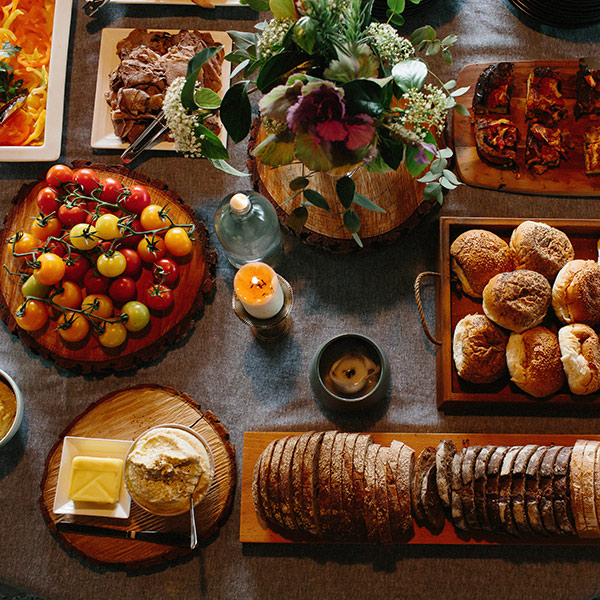
Venn Foundation desires to see people living well-examined and integrated lives, led by community and virtue.
In a culture of questions, we’re asking a few as well: Who am I? Why am I here? What are the big ideas of history and the cultural assumptions of today that shape the ways I think and act? How do I live well in a frantic and fragmented world? Does the Gospel paint a different picture? And does it offer a different way of seeing and of being?
Working largely with young adults from a range of professional and creative backgrounds, Venn provides contexts for them to continue their own journeys of examination and integration.
We host a range of formal teaching and creative learning programmes—from one-off seminars to our full-time Residential Fellowship. We offer opportunities for the strengthening of community networks—with family, with friends and with mentors. We also work actively with our alumni to fuel vocational and community initiatives—supporting them as they seek to imagine the world differently and serve across the breadth of Aotearoa New Zealand.
Why we do it? Our alumni. This growing group of connected friends committed to bringing their imagination, virtue, wisdom and humility into the realms of business, science, health, politics, education, media and the arts. And, of course, into their families, neighbourhoods, communities and churches.
WHAT WE DO
Venn was formed in September 2013, bringing together the work of the Compass Foundation and a well established internship programme (both of which had been running for more than ten years).
Through those ongoing programmes, and several new ones, Venn supports a growing community of alumni who seek to bring life, creativity and flourishing to Aotearoa New Zealand. We provide that support through teaching and resources, informal community gatherings, and initiatives where theory can become practice.
Venn is committed to walking with our Conference, Residential Fellowship, and Vocational Programme alumni over the long-term. We are dedicated to helping them develop their skills and character as they participate with God in the creative work of bringing life to the world.

Summer Conference
Young adults from across New Zealand meet for seven days in January to explore what it means to “Know the Gospel; Know Culture; and Translate.”

Residential Fellowship
Two homes, twelve residents, and seven months to explore ten thousand years of history, theology, philosophy, politics, economics, literature, music, art…and good food.

Vocational Programme
An eight-week offering for people in their late 20s to early 60s, who want to learn more about the wise life through Scripture, prayer, rich teaching, and conversation.

RESOURCES
Listen to a taster talk from last years Summer Conference, check out our books for sale, and we see what the staff have been reading, thinking and watching.
Never doubt that a small group of thoughtful, committed citizens can change the world.
Indeed, it is the only thing that ever has.
// Margaret Mead
WHY “VENN”?
In adopting the name Venn, we are deliberately evoking an extraordinary chapter in the unfolding story of the Church: the lives of Henry Venn (1725–1797), John Venn (1759–1813), and Henry Venn (1796–1873). Over three generations, the Venn family were central members and influencers of a celebrated community of friends—the so-called Clapham Group. This community represents for us an inspiring story of faithful response to the challenge of living out of the Gospel in a rapidly changing world.
It was John Venn’s son-in-law, Sir James Stephen, who as Permanent Under-Secretary for the Colonial Office drafted the instructions that would become the Treaty of Waitangi. And the Church Missionary Society, founded by John and later led by his son Henry, was pivotal to the signing of the Treaty; with Henry Williams, as leader of the CMS mission in Aotearoa, translating the Treaty, and advocating for it to Māori Chiefs.
The Venn family—three generations of clergy to this influential community—were right at the heart of this work, inspiring the community with a vision of the Gospel that understood God’s people are called to bring life and blessing wherever they are.
Drawing together business people, educationalists, politicians, lawyers, clergy, artists and their families, the Clapham Group responded to cultural challenges with energy, creativity and faith. They were influential in a wide range of social efforts in their native England and internationally, from the abolition of slavery—famously led by William Wilberforce—to the establishment of over 100 non-profit organisations, the ushering in of the precursors to the public education system, numerous labour and welfare reforms, and many other initiatives. The Clapham Group lived out the Gospel in ways that brought profound blessing to each other and to the world.
In New Zealand, we are direct beneficiaries of this Gospel vision. The Clapham Group’s reimagining of what it means to be human in light of the Gospel profoundly influenced British foreign policy in the mid-nineteenth century.
The Treaty process was not perfect and would indeed suffer much distortion by those who were to follow, but the actions of the Clapham Group resulted in a unique partnership effort for the first time in British colonial history. Their honest intentions and genuine desire to honour Māori should serve as a motivation for those of us committed to bicultural dialogue today.
The lives of this Clapham group—their work, and their faith—stand as testament to what can be effected by a small group of friends who choose to live imaginatively and selflessly out of the full Gospel. We are inspired by their witness.
It is no small coincidence that Henry Venn’s great grandson was also the creator of the Venn Diagram—a fitting picture of our vision for interlocking lives and works, each drawing on the other, motivated by the same mission to see more life and flourishing in the world.
THE STORY THAT UPHOLDS US
A modern story – with the self as character
Venn is committed to holding before its alumni community a theological vision that challenges the assumptions behind the modern understanding of freedom and identity.
In 21st-century Western culture, the dominant modern narrative of the self holds that we are radically free to choose what we believe, want and need—as well as what is right and what is wrong. These are matters of the human will, which is the ultimate authority.
Creating meaning, as opposed to receiving meaning
The radical autonomy of the modern self leads to the particularly modern anxiety that comes from the pressure to create meaning in the world, rather than receiving a way of life and purpose from outside of us. Modern individuals are disconnected from larger stories and contexts, so anxiously hunt about for an identity to create. The powerful narratives of consumerism are ready at hand and shape this identity-making process.
At Venn, we see that story revealed to us in the Gospel—the good news. It is a story with a vision big enough for all of life. It is big, and it is true. This Gospel finds both its end and beginning in the person of Jesus—God become flesh. It engages with questions of meaning, purpose, truth, beauty, life, justice, suffering, joy—the common core of human experience—and provides answers that are both compelling and challenging.
The Good News
This Gospel—with its Christ and its Cross—confronts our precious concepts of freedom and identity. It subverts our traditional hierarchies of power and control. And it inverts our popular notions of winners and losers, successes and failures.
This Gospel quietly but firmly demands a radical review of our obsession with self, and with status.
This Gospel—with its Christ and its Cross—confronts our precious concepts of freedom and identity. It subverts our traditional hierarchies of power and control. And it inverts our popular notions of winners and losers—of successes and failures.
The human longings for community and for belonging to something greater than the self are sabotaged by a conception of self that views freedom from community expectations and larger narratives as the only authentic path to selfhood. Moreover, the modern view of freedom inhibits many attempts to work toward the common good, because there are no agreed ‘common’ goods outside the basic good of freedom. We seek solutions that serve people as individual units, where it is in fact this definition of self and its political, cultural and economic enactment that causes many of our societal and personal griefs.
History has borne this out.
Another story – with someone else at centre-stage
The challenges our culture faces are, in the end, theological and anthropological: Who is God? Who are we? Our political, economic, legal, and cultural problems cannot be solved if we continue to reinforce the narrow modern view of freedom and selfhood.
We need an alternative story and vision.
Putting theory into practice
The danger for all of us is that many of our actions reinforce rather than confront the modern narrative. We may achieve short-term goods through our activities in the world, but we may do so in ways that promote rather than challenge the dominant modern anthropology. In the absence of being fed by an alternative theological vision, the ‘goods’ we seek may be misunderstood as products only of our own wills, or they may simply serve a notion of human beings as disconnected free agents.
Digging deep roots
Instead, our hope is that the Venn community can dig deep roots into a story and vision of life that we do not create, that exists outside of our wills, and helps give us identity and ethical purpose in the world. A story that will infuse our ideas and imaginations, and be expressed in our postures and practices.
In short, it is about obedience—obedience to the God whose story it is we desire to know. Everything we do at Venn is to that end.

